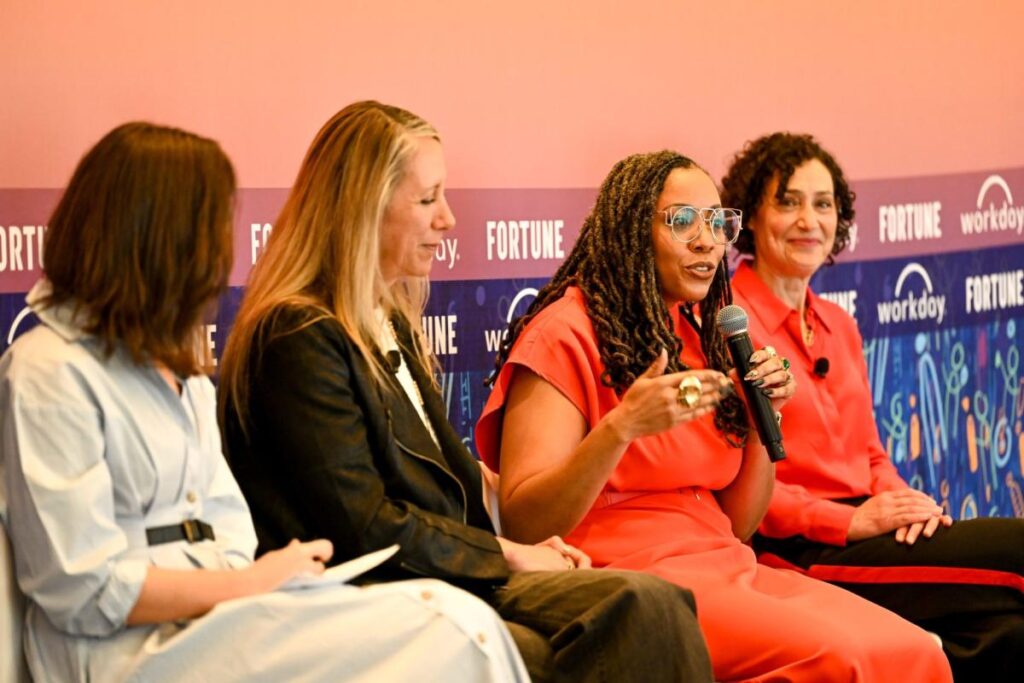A recent discussion at Fortune’s Most Powerful Women conference highlighted the significant barriers created by job listings that require a bachelor’s degree, effectively disqualifying 62% of American adults from many positions. This requirement disproportionately affects marginalized groups, with 70% of Black Americans and 80% of Hispanic Americans unable to meet this standard. Carrie Varoquiers, chief philanthropy officer at Workday, emphasized that insisting on college degrees cripples the diversity of thought and background within organizations. Varoquiers joined industry leaders, including Lisa Gevelber from Google and LaFawn Davis from Indeed, to examine the potential for skills-based hiring, which may open doors to a wealth of untapped talent across the U.S. workforce.
The expert panel acknowledged the economic stagnation caused by overlooking qualified individuals who do not possess a college degree. Distinguished figures in the business world, such as former IBM CEO Ginni Rometty and other influential leaders, have championed a shift toward prioritizing job-related skills over formal education credentials. While acknowledging the necessity of degrees for certain professions—like healthcare—Varoquiers argued that offices should focus on capability rather than academic history for many roles. The panel strongly advocated for assessing candidates based on their skills, thereby promoting a fairer and more inclusive hiring process that could reshape economic opportunities for millions.
LaFawn Davis described herself as a “STAR” (Skilled Through Alternative Routes) and reinforced that the essence of hiring should be centered around a candidate’s ability to perform job functions competently, rather than their educational pedigree. She called for hiring managers to prioritize concrete job requirements in their evaluations, rather than disqualifying applicants based on degrees. This perspective aligns with the ethos promoted by programs like Google’s Grow with Google initiative, launched by Gevelber. This program addresses systemic inequities in workforce access, helping individuals gain the skills necessary for high-demand jobs, a need that affects a vast portion of the American population lacking college degrees.
The conversation also aims to redefine the societal perception of education. While the panelists are not against obtaining degrees, they believe that educational achievement should not be the sole means to achieve socioeconomic mobility. Gevelber pointed to the Google Career Certificate program as a solution, which prepares students from diverse backgrounds for entry-level roles in fields such as cybersecurity and data analytics. This initiative has seen significant success, nearing its millionth graduate, demonstrating a growing recognition that career pathways should be versatile and accessible to all.
The changing landscape of job requirements has garnered attention from not only business leaders but also academic professionals. For example, Harvard Business School professor Joseph Fuller and University of Maryland sociologist Philip Cohen have both contended that white-collar occupations are increasingly moving away from strict college degree requirements. They noted that working professionals will likely need specific hard skills rather than general degrees, underscoring the evolving needs of employers. This reality indicates a growing consensus among academics and professionals that appropriate skills and training may eventually overshadow traditional educational credentials in many job markets.
In conclusion, the dialogue surrounding skills-based hiring reflects a critical shift toward inclusivity in the workforce. The changing attitudes highlight the need for organizations to reconsider their hiring practices to embrace a broader array of candidates who possess relevant skills, regardless of their educational background. By promoting pathways that focus on developing talent through skill acquisition rather than degree attainment, businesses stand to benefit from a more diverse talent pool, which can lead to improved company performance and a more robust economy. The emphasis on practical skills over degrees could catalyze meaningful change, redefining career opportunities for millions of Americans, particularly within communities historically marginalized in employment contexts.

